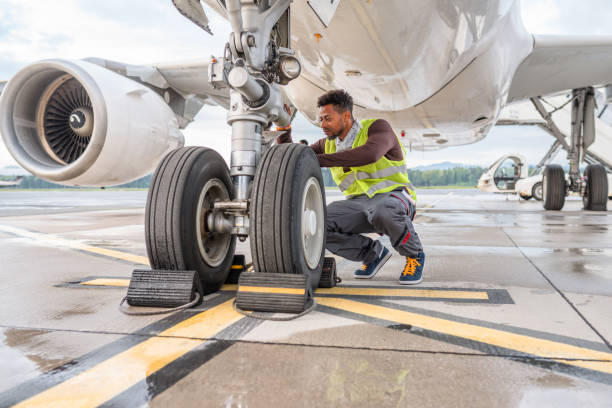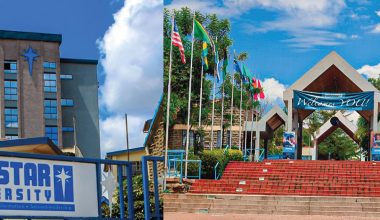Aviation is one of Kenya’s most prestigious professional disciplines with numerous employment prospects. Unknown to many, aviation encompasses more than just plain flight.
The industry offers a wide variety of employment opportunities. Professionals like pilots and hostesses work hard and persevere on the job.
What does it take to work as a professional in this field in Kenya? The secret is to find a suitable aviation course from an approved school and start your studies there.
While it’s a lucrative career, many people do not know what it takes to get into the aviation industry in Kenya, and our article will guide such people.
We will also examine the best Aviation schools in Kenya, the requirements you might need to meet before applying to such schools, and much more.
Table of contents
- Aviation courses in Kenya
- 10+ Best Aviation Courses in Kenya
- 8. Flight Dispatch
- 9. Aviation Business Management
- 10. Aviation Safety and Security (ASSM)
- 11. Aeronautical Design and Manufacturing
- 12. Aircraft Maintenance Engineering
- Universities/Schools/Colleges to Study Aviation in Kenya
- Career Opportunities in Kenya’s Aviation Industry
- Which school is the best to study pilot in Kenya?
- Requirements for Aviation Courses in Kenya
- How much is a Pilot Paid in Kenya?
- How long does an aviation course take in Kenya?
- Frequently Asked Questions
- Conclusion
- References
- Read Also
Aviation courses in Kenya
Selecting a course of study is difficult, particularly for recent high school graduates. The pressure from parents and other relatives to find something to do can overburden them into making ill-informed decisions.
Most of the questions asked include which aviation courses Kenya offers, the duration required to finish these courses, and what prerequisites must be met.
Even after the concerns have been answered, one must still worry about whether the schools adhere to aviation quality assurance.
There are quick, more than month-long online courses available in aviation. Everything you require is provided here.
Read Also:Daystar University Courses and Fees Structure
10+ Best Aviation Courses in Kenya
1. Avionics
This technician program trains students for careers in aircraft electronics systems, which are used in various aviation-related industries, including manufacturing, transportation, aerospace, defense, and healthcare.
Multi-agent systems, artificial intelligence, computer science, machine learning, adaptive control, mechanical engineering, and many more cutting-edge subjects are among the many advanced subjects covered in the course.
It is one of the most popular aviation courses in Kenyan universities. The cost is around $1620, or Ksh. 162 000.
This category includes course outlines, such as:
- Technical Mathematics
- Electronics in Digital Form
- Procedures for Safety, Airport, and Communication Systems
- Setting Up Avionics Systems
- Systems and Troubleshooting for Avionics Circuit Design for Avionics Navigation Systems
2. Airframes and Engines
The course emphasizes aviation mechanic programs, which are essential to creating and managing airframe structures. One of the prerequisite courses requires students to be interested in material science.
This course covers multidisciplinary technologies with applications in manufacturing, aerospace, defense, transportation, and healthcare, among other fields.
The cost of the course is approximately Ksh. 162,000, or $1620. This category includes course outlines, such as:
- Engineering
- Mathematics
- Airframes
- Powerplant Systems
- Airfield and Safety Procedures
- Installation Aerodynamics
- Mechatronic Systems
- Material Science
3. Pilotage Activities
The field of airline operational control can benefit from the knowledge and abilities acquired in this course.
This serves as the hub for airline operations. The training strongly emphasizes the standards essential to the airline sector.
The training gives learners the much-needed professional competence they need to carry out their duties effectively and efficiently, guaranteeing aircraft’s regular and safe operation. The course will likely cost $1250, or roughly Ksh. 125,000. This category includes course outlines such as:
- Aircraft General Knowledge and principles of Flight Air law,
- ATC Procedures and Operational Procedures
- Radio Navigation and Instrumentation
- VFR and IFR Communication Instrument
- Procedures Meteorology and Flight Planning
- Mass and Balance and General Navigation Performance, Human Performance and Behavior
Read Also: Official List Medical Courses in Kenya and their Requirements | 2024 Fees
4. Cabin Crew
The program offers a route for people to become exceptional flight attendants in the world’s leading airlines.
After completing this course, students will better understand the aviation industry and the information needed to succeed in it.
Key abilities are useful to ensure the safety of the passengers and the aircraft throughout routine, unusual, and emergency operations. There is a course fee of roughly Ksh. 85,000, or $850. This category includes course outlines such as:
- First Aid, CPR and AED In-Flight
- Service Cabin and Flight Simulation
- Basic English and Foreign Language Communication
- Water Confidence Makeup, Grooming and Etiquette Airline Terminology Introduction of Aviation industry
5. Flying
Most of this course is practical, allowing students to travel to new places, experience a unique level of independence and adventure, and eventually accrue the hours needed to obtain a PPL and any other licenses.
This is the finest option for those who want to become pilots. After completing a course, an individual can obtain a Private Pilot or Commercial Pilot License, signifying that they have gained flying proficiency.
It takes at least 47 hours to finish to qualify for the exam. The cost is $155 per hour (about Ksh. 15,500) and must be paid for each flight hour. This category includes course outlines such as:
- Air Law
- Aircraft General Knowledge- Electronics, Undercarriage, Airframe Flight Performance and Planning
- Mass and Balance Flight Performance
- Meteorology
- General Navigation
- Operational Procedures
- Aircraft General Knowledge- Instruments Navigation Plotting VFR Communications/ Radio Telephony
- Theory of Flight Flight Planning and Monitoring Human Performance and Limitations
6. Maintenance Engineer
Safety is vital in this sector. Students pursuing the degree of maintenance engineer are taught the complexities of the complete aircraft.
This demanding course equips students with skills that help diagnose and fix aircraft systems across all model types.
Aircraft maintenance employs both acquired practical experience and theoretical understanding. To become a maintenance engineer, an individual must pay a minimum of $1620, or roughly Ksh. 162,000. This category includes course outlines such as:
- Engineering Mathematics (Modular)
- Airframes (Modular)
- Technical Drawing (Modular)
- Mechatronics (Modular)
- Aerodynamics (Modular)
- Workshop (Modular)
- Powerplant (Modular)
- Material Science (Modular)
Read Also: Strathmore University Courses | Requirements and Fees
7. Ticketing
Although it may seem like a simple task, ticketing is rather essential. It is like a puzzle piece in that nothing makes sense without it.
Students working in the ticketing industry receive further instruction in using worldwide distribution networks, IATA BSP, and other fare computation techniques.
After finishing, students should have no trouble purchasing tickets and determining the cost of air travel.
Their expertise comes in handy on convoluted trips where there can be deviations from accepted pricing guidelines.
The price is approximately $850 (Ksh. 85,000); the exact amount may vary according to the school. This category includes course outlines, such as:
- Currency Conversion and Rounding Review of Fare Selection
- One-Way Fare Construction Round and Circle Trip
- Fare Construction Pricing Unit versus Fare Component
- Introductions to Ticket Alterations
- Exchange Transactions
8. Flight Dispatch
All the knowledge needed to become a Designated Aircraft Dispatcher is taught in Flight Dispatch.
The primary goal of the course is to train students to obtain important abilities that exhibit competency in weather, rules, ATC procedures, aircraft equipment and performance, and flight planning.
Before completing the course, a payment of around $1250 (roughly Ksh. 125,000) is expected. This category includes course outlines such as:
- Flight Scheduling Air Law, ATC Procedures, and Operational Procedures.
- Radio Navigation and Instrumentation.
- Transportation of Dangerous Goods by Air
- Air Traffic Management Meteorology and Flight Planning.
- Mass and Balance and General Navigation Performance.
- Human Performance and Behavior
9. Aviation Business Management
Flight Planning Operational procedures, ATC procedures, and air law. Instrumentation and radio navigation. Airborne Dangerous Goods Transportation Management of Air Traffic Weather and Flight Scheduling.
General Navigation, Mass and Balance, Performance, Human Performance, and Conduct are all part of Aviation Business Management.
- Quality Management Systems for Civil Aviation Auditing Techniques ( For Aircraft Environment)
- Customer Care Supervisory Management
- Executive Civil Aviation Management Travel and Tourism Foundation (IATA Diploma)
- Air Cargo Introductory Dangerous Goods Regulations Advanced Cargo Rating and Marketing (IATA Diploma)
- IATA Certificate in Airline Cabin Crew Revenue Collection in Civil Aviation.
- Diploma in Tours and Travel Management.
- Diploma in Airport Operations.
- Diploma in Air Cargo Management of Strategic Change
- Bachelor of Civil Aviation Management Master’s in Business Administration
10. Aviation Safety and Security (ASSM)
The course is designed to guarantee that students are prepared for all important safety information. Passenger handling and flight operations must go smoothly to ensure safety.
Read Also: List of Hospitality Courses in Kenya | Requirements and Fees
11. Aeronautical Design and Manufacturing
This aeronautical engineering segment focuses on designing and creating aircraft parts and systems. Engineers in this field are responsible for the innovative technology that keeps the aviation industry moving forward.
Moi University’s Department of Aeronautics offers a specialized aeronautical engineering course that prepares students for careers in research and manufacturing.
12. Aircraft Maintenance Engineering
Aircraft Maintenance Engineering is a highly specialized course that equips students with the knowledge and skills to ensure that aircraft remain in optimal condition. This training includes hands-on experience with aircraft systems, diagnostics, and repair.
Graduates of this program are qualified to inspect and maintain aircraft, ensuring the highest safety standards are met. Schools such as Rift Valley Technical Training Institute and Kenya Aeronautical College offer comprehensive programs in this area.
Universities/Schools/Colleges to Study Aviation in Kenya
- Kenya School of Flying
- Nairobi Aviation School
- East African School of Aviation
- Ninety-Nines Flying School
- Flight Training Centre
- Mt Kenya Flying School
- Kenya Aeronautical College
- West Rift Aviation School
- Skylink Aviation School
- Alpha Aviation Flying School
- Nairobi Flight Training
- Capital Connect Aviation
- Standard Aviation Flying School
- Proactive Air Services
- Nairobi Aviation College
- Epic Aviation College
- Transeastern Airline Aviation College
- Skypath Aviation College
- Eagle Air Aviation College
Read Also: 15 Best Nursing Courses in Kenya and Qualifications PDF
Career Opportunities in Kenya’s Aviation Industry
- Pilot
- Aeronautical Engineer
- Air Traffic Controller
- Cabin Crew
- Airport Manager
- Flight Dispatcher
- Aircraft Maintenance Engineer
Which school is the best to study pilot in Kenya?
The schools listed above are top-rated for aviation courses in Kenya. However, Alpha Aviation has a variety of fleets to give you a wider scope and understanding. They offer the best and most certified piloting course in the region.
Requirements for Aviation Courses in Kenya
You will need to fulfil several requirements before enrolling in a Kenyan institution to pursue a degree in aviation. The first condition is that your academic record matches the minimum subject criteria of the Kenyan school you wish to attend.
This includes a mean KCSE grade of C or equivalent, with at least a C in English, Mathematics, Physics, or Physical Science. Some Kenyan aviation schools will accept a mean KCSE score of C+ or above in English, math, geography, and other science courses if those courses aren’t offered.
- Sixteen years of age or older,
- You must be in good health and hold a fitness certification approved by an aviation medical examiner.
- A Good Conduct Certificate
- Three internal written assessments in math, English, and psychometric testing must be passed.
- Copies of academic documents, passports, birth certificates, and NID cards
- Six passport-sized pictures
- Five flight assessment lessons
How much is a Pilot Paid in Kenya?
A pilot’s expected monthly income is KES 399,582 in the Nairobi region. This number, which is the median, represents the middle of the ranges.
How long does an aviation course take in Kenya?
A full-time course is approximately 8 to 12 months long. The Kenya Civil Aviation Authority has approved a minimum grant of 200 hours of flight training for a CPL.
Read Also: Utalii College Courses and Qualifications | 2024 Fees
Frequently Asked Questions
In the Kenya Air Force, a Flight Lieutenant makes KSh 102,106 a year, a flying officer makes Sh 73,182, a corporal makes KSh 32,250 a year, and a Leading Aircraftman II makes KSh 26,509.
An average of KSH 5,025,000
Aeronautical engineering and a diploma in airport operations
65 years of age is the retirement age for airline pilots in Kenya.
Conclusion
In conclusion, aviation courses in Kenya offer excellent opportunities for those aspiring to build a career in the aviation industry. With a wide range of programs, such as pilot training, aeronautical engineering, and aircraft maintenance, students can pursue specialized paths that suit their ambitions.
The high-quality training, modern facilities, and growing demand for skilled professionals in the aviation sector make Kenya an ideal place to start your journey. Whether aiming to become a pilot or engineer, the right aviation course can help you achieve your dreams in this dynamic industry.
References
- Aviation courses and colleges offering them in Kenya – https://www.tuko.co.ke
- Top 10 Best Current Aviation Schools in Kenya – https://institutiontoday.com






